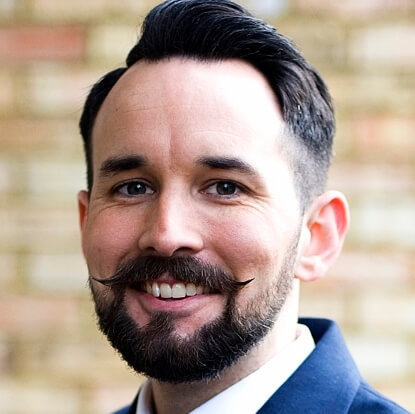To build a great business first you must defeat your instinct to procrastinate, then overcome the temptation to copy those who went before you.
The Secret To Success: Be Different And Don't Hang About
To build a great business first you must defeat your instinct to procrastinate, then overcome the temptation to copy those who went before you.

As a behaviourist, I had two distinct advantages that enabled me to sky-rocket the growth of my own business. In my role working with some of the largest and most successful brands around the world, I learnt a lot about what other organsations do and how they do it.
My professional understanding of people also gave me useful insights about which business practices work really well and why.
For any business to enjoy huge success, as so many entrepreneurs are hungry for, two things need to be fully understood: why being different is important and how to smash procrastination.
Edward Young said that “procrastination is the thief of time”, however, really we are the thief of time. If we need to see change or improvement in any behaviour, the very first part is to accept full responsibility for our responses and also for the consequences of those responses.
Blaming procrastination for not getting something done is not helpful because it comforts us by labelling what feels like a third party at fault. A hugely successful client of mine when asked about procrastination, told me that it is abundant in those who have no self-respect.
Seizing the day
I agree to a point, however, I think I’d replace the word ‘respect’ with ‘responsibility’. We are very good at procrastination as a species simply because we’re actually quite lazy. If someone else can do it for us then all the better!
The second crucial reason that procrastination takes its hold so strongly is due to a lack of knowledge, direction or focus. Or all three.
Grab a notebook and a pen and carry out my ‘A.B. Split Test’ for every challenge you come across, or indeed at the beginning of each day: Write the letter ‘A’ and underneath it detail your current situation: where are you right now?
Use words, phrases, thoughts and feelings to describe your current position, perhaps personally or thinking specifically about your business.
When you’ve exhausted that, turn the page to a new piece of paper and head it with ‘B’. Repeat the exercise but this time consider where you need to be, want to be, should be or could be: what is the future? You’ll likely find this part much easier as we tend to focus on the future, whilst neglecting focusing on where we are now, in order to build a logical plan to achieve it.
Finally, turn the page and write the letter ‘C’ at the top: what is the difference between where you are now (your ‘A’) and where you need to be (your ‘B’)? What do you need to do in order to move you forwards?
This will not only help you to focus on the reality and approach it more logically but your to-do list is formed out of the ‘C’, leaving you with a very clear plan. You can download my especially designed ‘Kick-Arse To-Do List’ that actually helps you to get things done.
Kicking things off
Having a to-do list is a great start; it helps us to plan time, focus, keep track of tasks and avoid procrastination. However, they’re not so useful if the contents are the same as every other business. Albert Einstein famously spoke about needing to do things differently in order to see something different; in other words, we can’t keep repeating the same behaviours and expecting different results.
Yet so many businesses owners do just that. It is understandable because when we begin any new journey, we tend to emulate those more successful than ourselves. Copying what others do brings with it a sense of security and comfortable reassurance; however, it doesn’t make for a great recipe for success.
At best you become a second-rate version of the person you copied.
Those individuals and organisations I spent time with and researched, who had achieved extraordinary things, made a conscious leap of faith to achieve something different; it was as if they understood, consciously or otherwise, that they had to choose alternative behaviours. It could well be an educated hunch or professional inkling, or even a creative desire to do something different.
The Innocent approach
Much has been written, for example, about ‘Innocent’, the soft drinks company started by a group of university friends with a fascination for healthy drinks. Contrary to popular belief, they weren’t in fact the first company to sell healthy drinks, or even smoothies.
However, the recognised that people don’t especially like or take kindly to being told what to do. We engage much better with tasks – and brands – when we are helped to form our own opinions, which boosts our sense of autonomy.
Innocent took a radical approach with fun packaging, quirky copy writing and a very simplistic and transparent design: here was a brand approaching things differently.
It was almost as if they’d looked at everything all of the other drink manufacturers were doing and decided they would do the exact opposite - that in itself is a very effective technique: look at what your competitors are doing and ask yourself two questions.
Firstly, why do they do it this way? Then: how can we make it better? You’ll end up pushing your own creative comfort zone, whilst at the same time challenging the status quo for all the right reasons. Normal is taken – choose extraordinary!
Whatever the driver, it is also essential to look outside of your industry for creative influence: if you are in haulage, for example, what are florists or independent restaurants doing to attract new customers, nurture existing ones or to successfully promote using social media?
What can you do to disrupt your industry, by doing something differently and standing out? It is our ability to challenge the status quo; to challenge every system, process and behaviour; to ask “why do we do it this way?” and “how can we make it better?” that will move any organisation forward.
It is, quite remarkably, the simple things that often create the most extraordinary results.
Jez Rose is author of Flip the Switch, published by Capstone.
Thanks for signing up to Minutehack alerts.
Brilliant editorials heading your way soon.
Okay, Thanks!




